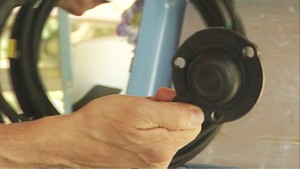
The voltage (or sound) is sampled at a very high rate - 196 thousand samples per second - which is 4 times higher than compact disc sample rates.
According to Veirs, sampling high frequencies that are above the human hearing range allows him to study the intricacies of orca language; more importantly, he wants to show how noise such as boats and ships make it harder for orcas to communicate and hunt.
In studying orcas, Veirs uses a complicated set of algorithms to discriminate against 99.9% of the sounds that come through the hydrophones. Orcas produce sounds that have a very simple harmonic structure, and that’s what his software looks for.
“Orcas make sounds with frequencies that change in a smooth way, with most of the energy in 3, 4, 5 peaks,” says Veirs.
“And sounds that have a complicated harmonic structure - with many frequencies in it are discriminated by the software, because these are sounds not typically made by orcas.”
The Southern resident orcas in Friday Harbor are considered an endangered population segment by NOAA (National Oceanic and Atmospheric Administration). Ultimately, Veirs wants to use his research to create public policy that urges boats to slow down, stay farther away from the orcas, and to use quieter engines.
“Once we understand that these noises may make it harder for the whales to forage, to communicate, then we have a chance to take some societal steps to give them a better chance of surviving…That is the best hope we have for them.”
